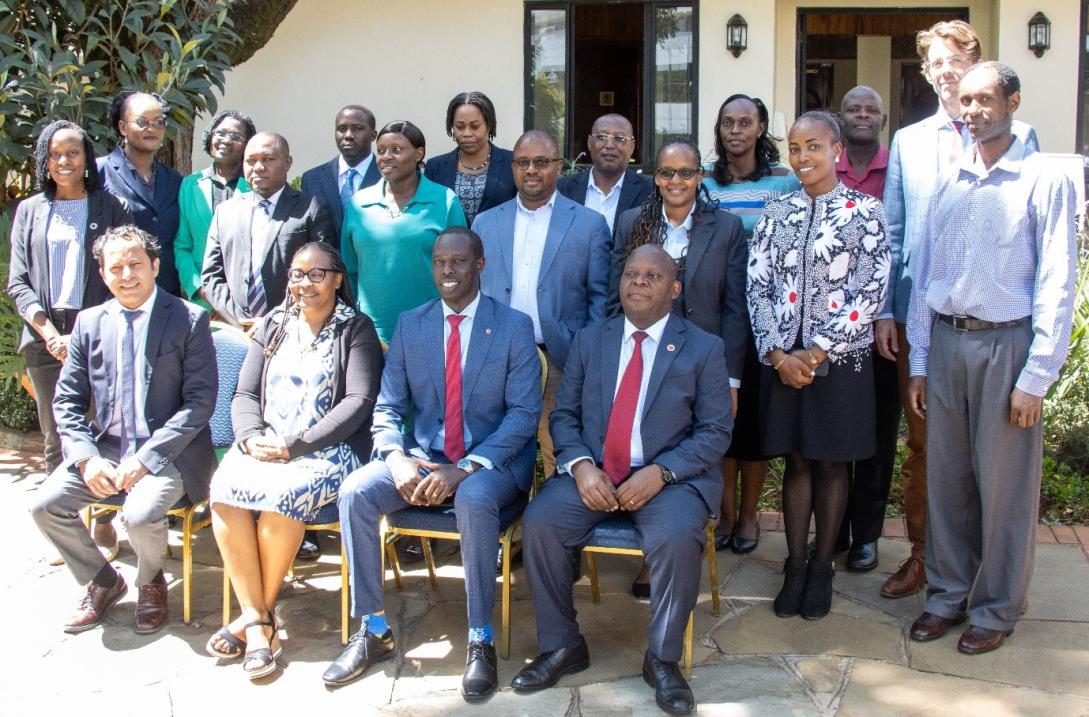Strengthening CBRN Preparedness regional meeting in Nairobi

The European Union's CBRN Risk Mitigation Centres of Excellence Initiative (EU CBRN CoE) continues to advance efforts in chemical, biological, radiological, and nuclear (CBRN) risk management. As part of these ongoing initiatives, the CBRN National Team of Kenya held a meeting on 27-28, 2025, at the Jacaranda Hotel, Nairobi, bringing together key stakeholders to discuss strategic approaches to mitigating CBRN threats. Kenya has been a member of the Initiative since 2012 and also hosts the Regional Secretariat for the Eastern and Central Africa region.
The European Union Ambassador to Kenya, H. E Henriette Geiger noted, “Strengthening preparedness for CBRN is essential, particularly now when we are witnessing complex global threats that are sometimes planned and executed across borders. Global security challenges require collaborative solutions built on mutual trust, shared expertise, and coordinated action. Kenya has been an exemplary partner in this endeavour. Kenya’s commitment to strengthening CBRN risk mitigation frameworks not only enhances the security of its citizens but also contributes significantly to regional and global stability. The EU values this partnership and remains dedicated to supporting these efforts through technical assistance, knowledge sharing, and targeted project funding.”

Kenya Nuclear Regulatory Authority, 2025
This EU funded global Initiative provides a platform for voluntary regional cooperation on all CBRN-related hazards and supports Partner Countries in strengthening the long-term national and regional capabilities. Representatives from the European Union, UNICRI, regional Projects and over 15 government agencies outlined the next steps for implementing the CBRN National Action Plan (NAP) and reviewed progress of EU-supported projects. In attendance at the event, Mr Louis Dey, the EU Programme Manager, who delivered remarks on behalf of the EU Ambassador, Mr William Munyoki, the Government Chemist and CBRN National Focal Point of Kenya, Mr James K. Chumba, the DG of Kenya Nuclear Regulatory Authority and the Regional Head of Secretariat.
The CBRN National Team is the national pillar of the Initiative, as it is tasked with assessing national needs, formulating project proposals and promoting coordination of CBRN policy amongst relevant institutions at a national level.
The National Focal Point expressed appreciation to the EU for financial and technical support for the last 13 years and emphasised on the need to finalise and formally endorse the National Action Plan. This will enable the country to integrate and develop new policies to strengthen Kenya’s preparedness and resilience against CBRN threats.
The two-day event focussed on:
✅ CBRN National Action Plan (NAP). The purpose of the CBRN National Action Plan is to provide the policy framework to guide the creation and maintenance of sustainable capabilities and common standards in CBRN policies, programmes, equipment and training. The team addressed the gaps identified during previous workshops and also categorised emerging risks/threats in the country. This opened discussions on the need to develop a strategic roadmap for implementation of the Plan and prioritisation of key activities.
✅ Reviewing the progress of EU-funded regional projects. Through the generous funding by the EU, projects tackling CBRN risks and threats have been implemented successfully in the region.
- With the emergence of global health threats such as COVID-19, Ebola, and antimicrobial resistance, the importance of biosafety and biosecurity cannot be overstated. Partner countries in the region have put in place measures to mitigate the risks brought about by biological agents through P99 ‘Strengthening Biosafety and Biosecurity capabilities in East and Central Africa’.
-
The capacity to prevent and respond to CBRN incidences is enhanced by technical knowhow of relevant personnel in key institutions. However, lack of specialised equipment continues to hamper efforts in detection, analysis and response within the region. The EU has provided funds to procure, deliver, and install specialised equipment dedicated to CBRN preparedness and response to Partner Countries in East, Central, North, and West Africa in collaboration with United Nations Office of Project Services (UNOPS).
These 2 ongoing projects in addition to the global project on exercises (P106, CBRN Table top and field Exercises, Simulations, Training (TEST) to mitigate risks) are expected to enhance CBRN risk mitigation capacity of Kenyan Authorities and contribute to the overall objective of the CoE Initiative which is to address specific global and trans-regional threats to peace, international security and stability, through enhancing governance and cooperation on CBRN risk prevention, detection and mitigation.



